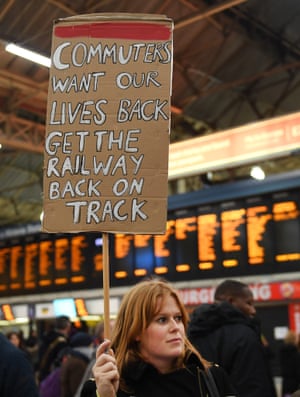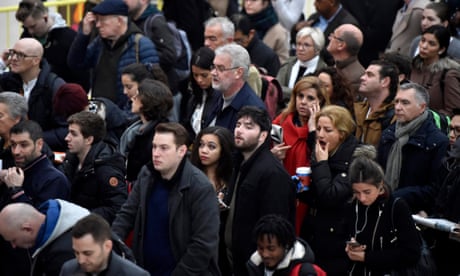We seem to love the working class as long as it is a) white and b) passive. The real working class is neither. It is multi-ethnic and, from Southern Rail to British Airways, it is set to strike.
Predictably, the Conservatives are calling for more legal restrictions on strike action. Theresa May accused strikers of “contempt for ordinary people”. And – as always – the neck veins of TV reporters are bulging as they express outrage on behalf of those affected.

Union leader says No 10 demonising working people in strikes row
Yet, try as they might, the politicians and journalists have failed to stir up mob hatred against the strikers, some of whom – such as the Southern Rail drivers and guards – have been taking industrial action for weeks. And the reasons for this are obvious: they are ordinary people.
While the miners and steelworkers of the 1980s worked in relatively insular steel and mining towns, everybody knows a BA cabin steward, a train guard, a baggage handler or a Post Office counter worker. What’s more, because so much of our work has become modular, low-paid and deskilled, many people know, or can guess, exactly what they are going through.
We have near full employment yet near wage stagnation. The strikes taking place over Christmas are happening among workers who have not seen a pay rise for years. BA’s onboard customer service managers, for example, have been stripped of their union negotiation rights and had their pay frozen for six years.
One of the most pitiful things about the political class, and the economists who whisper certainties in their ear, is their distance from the actual experience of work. As trade union rights have become eroded throughout the private sector, and large chunks of the public sector become privatised, a culture of coercion has taken root at work.

A commuter protests in support of Southern Rail staff. at Victoria Station in London. Photograph: Andy Rain/EPA
It does not have to be as bad as the leading fast-food cafe chain where a secret shopper deducts the bonus of an entire shift if one person does not smile. But it is pervasive.
Generally, you are supposed to smile, supposed to exhibit happiness for your seven quid an hour, obey orders without question, to hit meaningless targets or scam them on the instruction of your line manager – and, increasingly, you’re supposed to pretend you are self-employed.
You can spend entire days, if you think about it, being served only by people with no actual employment status: the Uber driver, the hairdresser, the physiotherapist. Even businesses where you’re paying a limited company through your credit card now routinely require their “associates” to be self-empolyed.
The result looks like a fake-tan version of Downtown Abbey with all the same levels of deference but zero paternal responsibility. And deep down, people who work for a living understand the modern “contract” between worker and employer is barely worth the paper it is written on.
That’s why workers with union rights and relative job security use the strike weapon. It’s never pleasant. But every cabin worker at BA and Virgin knows that, without the unions, they would see their pension rights stolen and their conditions eroded to the same levels enjoyed by their counterparts at the budget airlines.
And what’s driving the attacks is always the same familiar, financial pressure. Public services, once privatised, are forced to enter a race to the bottom in terms of pay, conditions and pensions for their workers. Once financial logic overtakes the logic of providing a service as efficiently as possible, you get the stupidities of Southern Rail, which cut its services to passengers in order to provide itself with an achievable target.
Jeremy Corbyn has been condemned for failing to condemn the strikes – and for attending a Christmas party with the Aslef union. If it were up to me, Corbyn would actually throw a Christmas party, not just for the Aslef strikers but for all the workers toiling on basic pay, fictitious contracts and unachievable targets over the festive period.
Those of us in unions – and there are still millions of us – know they make a massive and positive difference. Because workers on London Underground are unionised, there is a guard at my local tube station who refuses to wear any other name badge than one with “Lenin” on it.

No 10 accuses striking workers of 'contempt for ordinary people'
Although I do not recommend this level of resistance for everybody, it is a physical symbol of the fact that unionised workers are people you do not mess around with.
The Southern strikers, the BA crews and the Post Office workers are showing a different side of what it means to express your collective identity at work. So did the junior doctors, whose determined action got them a better deal than their leaders originally thought they could achieve.
Coming on top of the strikes by Deliveroo riders and a union-led court victory for Uber drivers, these are signs that even the heavily casualised workforce of the 21st century will not suffer indignity for ever.
In economics, it has become common to hear that one of the main failings of the current system is wage stagnation; even the Bank of England would like to see more inflation. So don’t complain about the posties, train drivers, cabin crews and baggage handlers – they’re only doing what we all should in 2017.
Ask for a pay rise, defend your pension rights, insist that work conditions are respectful and safe – and demand your employer negotiates with a real trade union and pays the rate for the job.